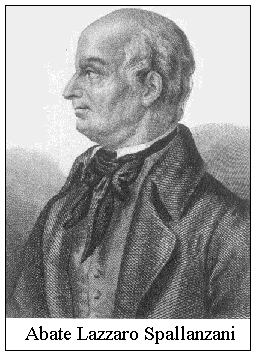Spallanzani, Lazzaro (1729–1799)

Lazzaro Spallanzani was an Italian naturalist whose experiments were the first to cast doubt on the long-held belief that microorganisms can arise by spontaneous generation. In 1765, he set out two sets of vessels containing a broth. One was left open to the air, the other was sealed after the broth in it had first been boiled to kill any bacteria that might already be present. Spallanzani observed that only the broth which had been sealed remained sterile. Proponents of spontaneous generation, however, remained unconvinced, arguing that the boiling had destroyed some "vital principle" in the air which explained why no microbes appeared in the closed container. It remained for Louis Pasteur, almost a century later, to finally settle the issue.
Spallanzani was born at Scandiano, in the duchy of Modena. After studying, at Reggio di Modena and Bologna, natural science, mathematics, classical languages, law, and other subjects, he was appointed in 1754 to the chair of Logic, Metaphysics, and Greek at Reggio, and soon afterwards he was transferred to Modena. But he took the greatest interest in natural history and physiological questions, especially the doctrine of spontaneous generation propounded by Needham and Buffon.
On the re-establishment of the university at Pavia Spallanzani was appointed (1768) professor of Natural History and keeper of the museum, which he enriched with specimens of fish, crustacea, and testacea, the fruits of his numerous travels. In 1785-86 he spent almost a year in Turkey, engaged in scientific observations, and during 1788 visited Naples while Vesuvius was in eruption, the Lipari Isles, and Sicily, and wrote an account of his inquiries, Viaggi alle due Sicile (6 vols. 1792).
In Dissertationi de Fisica Animale e Vegetale (2 vols. 1780) he clearly demonstrated the true physiological nature of digestion, and established, on the basis of experiment, the respective functions of spermatozoa and the ovum in reproduction.


